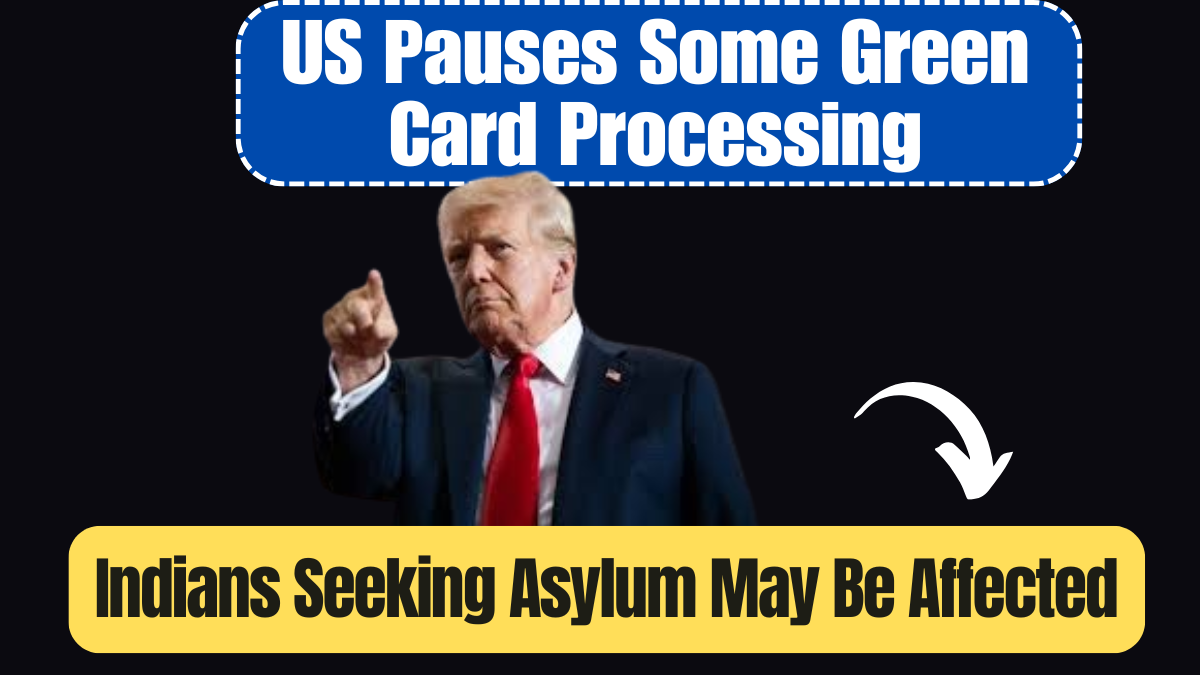The United States has temporarily frozen the processing of certain Green Card applications, particularly those from individuals who were previously granted asylum or refugee status. This move comes as part of the Trump administration’s intensified immigration policies, aimed at ramping up security checks and minimizing fraud within the system.

Why Was Green Card Processing Paused?
According to the Department of Homeland Security (DHS), the pause is aligned with two executive orders issued by President Trump. The orders demand rigorous vetting of all individuals intending to enter or already present in the US. In line with these directives, US Citizenship and Immigration Services (USCIS) is temporarily halting the final processing of select Adjustment of Status applications. The reason: to conduct additional screening for fraud, public safety, and national security risks.
How Are Indians Affected?
This development is particularly relevant for Indian nationals. In 2023 alone, over 51,000 Indians applied for asylum in the US—a sharp rise from 9,000 in 2018. Many of these individuals cited fear of persecution in their home country as the reason for seeking refuge. Now, with Green Card processing halted for such applicants, thousands of Indians could face extended wait times, uncertainty, or even risk of deportation.
Who Is Impacted by the Freeze?
The freeze targets people who already received asylum or refugee status and are now applying to become permanent residents through a Green Card. It includes those who have undergone medical screenings, interviews, and background checks, and have been deemed eligible by immigration judges or officers.
What Prompted This Decision?
The Trump administration has been increasingly critical of asylum and refugee programs. Its latest executive orders aim to:
-
Question the vetting processes used during previous administrations
-
Label certain criminal groups, like Tren de Aragua, as foreign terrorist organizations
-
Expand background checks by monitoring social media profiles of applicants
-
Pause applications from Latin Americans, Ukrainians, and others over fraud concerns
These orders, though facing legal challenges, have already had a chilling effect on immigrant communities.
Green Card Holders Facing Scrutiny
Not only asylum seekers but also existing Green Card holders—including Indians—are now under tighter scrutiny. Reports of deportations and voluntary departures have increased, especially among students and protest-linked individuals. For instance, Indian student Ranjani Srinivasan recently self-deported to Canada after being linked to campus protests, and another Indian researcher narrowly avoided deportation.
What Immigration Experts Are Saying
Experts like Laura Collins of the George W. Bush Institute argue that those seeking asylum have already undergone thorough background checks. “There’s a certain amount of documentation you have to provide… the US government has already approved them to be here,” she said. The additional pause could therefore unfairly extend wait times for legitimate refugees.
READ MORE: DoorDash to Pay Settlement in 2025 – How to Claim Your Share?
What Happens Next?
While the freeze is temporary, no clear timeline has been provided for when the processing will resume. Until then, asylees—many of them Indians—must wait longer for permanent residency, with the added pressure of evolving immigration policies and political narratives.
FAQs
Who is affected by the Green Card freeze?
Asylees and refugees, including many Indians, who were previously approved to live in the US and are applying for permanent residency.
Why is the Trump administration pausing these applications?
To conduct additional fraud and national security screening in compliance with new executive orders.
Does this apply to all immigrants?
No, only specific groups such as those applying under asylum and refugee programs, or individuals flagged for extra scrutiny.
What about people already granted asylum?
Even after being granted asylum, they must now undergo further vetting before receiving their Green Card.
Can this decision be challenged?
Yes, parts of the policy are already being contested in US courts.
Click here to know more.
